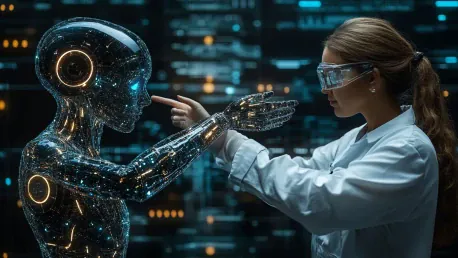In the rapidly evolving landscape of the staffing industry, integrating artificial intelligence (AI) and automation is an especially daunting challenge. The rise of these advanced technologies offers remarkable promises to streamline operations, accelerate procedures, and match candidates with unprecedented efficiency. Yet, the underlying concern remains: can we harness these benefits without sacrificing the essential humanity in hiring processes? How can we utilize AI to augment, rather than replace, human recruiters to maintain the necessary personal touch?
The Role of AI in Automating Tasks
Automated Resume Screening
One of the most significant advantages AI brings to staffing is the automation of time-consuming administrative tasks such as resume screening. This advanced technology can analyze mountains of resumes quickly, eliminating human bias and accelerating the often arduous recruitment process. AI-driven systems use specific algorithms to identify qualifications, experience, and key skills, ensuring recruiters have more time to focus on the subsequent stages of the hiring process. Furthermore, automated resume screening can offer a level of consistency and impartiality that is difficult for human recruiters to match.
By reducing the volume of manual resume screening, recruitment teams can redirect their efforts to build more meaningful connections with top candidates. However, it’s vital to address the potential pitfalls of this approach, particularly concerning algorithm biases. An unintended consequence of relying on flawed data sets or imperfect coding can be the reinforcement of pre-existing biases, thus perpetuating inequality in hiring practices. Regularly auditing these AI tools can help mitigate such risks and promote fairness in the recruitment process.
Chatbots and Virtual Assistants
Chatbots and virtual assistants are transforming candidate communication by offering real-time assistance and updates throughout the hiring process. These AI-powered tools can handle a significant volume of inquiries, providing immediate responses to candidates’ questions while fostering an interactive experience. Virtual assistants automate scheduling interviews, sending follow-up emails, and tracking the progress of applications, all of which help streamline the recruitment workflow.
Despite their efficiency, chatbots should not wholly replace human interactions. They effectively manage straightforward, repetitive tasks but lack the empathy and personal touch that human recruiters bring to the table. Human recruiters excel in navigating complex conversations, providing personalized career advice, and making candidates feel valued. A blend of AI support and human engagement ensures a robust, responsive experience where candidates can benefit from seamless technical interactions while still receiving personal attention when necessary.
Enhancing Hiring Decisions with Predictive Analytics
Data-Driven Decision Making
Predictive analytics is revolutionizing hiring decisions by enabling recruiters to leverage data for more informed choices. These AI-driven tools analyze vast amounts of data, such as past hiring trends, candidate performance metrics, and industry benchmarks, providing insights that help predict a candidate’s future job performance and cultural fit within a company. By using data to inform hiring decisions, recruiters can minimize the risks of bad hires, thus saving time and resources.
Additionally, predictive analytics offers the advantage of identifying patterns and trends that may not be immediately apparent to human recruiters. This allows organizations to make proactive adjustments to their hiring strategies, aligning them more closely with evolving business needs. However, the reliance on data must be balanced with human intuition and judgment. Recruiters should use these insights to complement, not replace, their expertise in assessing a candidate’s potential and suitability for a role.
Matching Candidates to Jobs
AI’s capability to match candidates to jobs based on their skills, experience, and cultural fit is another transformative innovation in staffing. AI algorithms can process job descriptions and candidate profiles to identify the best matches, significantly reducing the time recruiters spend on manual searches. This efficient and targeted approach helps ensure that the most suitable candidates are shortlisted for interviews, enhancing the overall quality of hires.
While AI-driven matching is highly efficient, it’s essential to remember the human element in this process. AI may highlight potential matches, but human recruiters are crucial in evaluating the intangible qualities of a candidate, such as soft skills, adaptability, and team dynamics. An effective recruitment process integrates AI’s precision with the nuanced understanding human recruiters provide, achieving a balanced approach that maximizes both efficiency and candidate engagement.
Maintaining the Human Touch in Staffing
Emotional Intelligence and Relationship-Building
Despite the numerous benefits AI and automation offer, human recruiters’ roles remain indispensable, especially in areas requiring emotional intelligence and relationship-building. Human recruiters bring a unique ability to assess a candidate’s soft skills and cultural fit, offer personalized career advice, and navigate delicate conversations with tact and empathy. These qualities are vital in creating meaningful connections between job seekers and employers, ensuring a positive candidate experience.
Emotional intelligence is particularly crucial during complex negotiations or when providing feedback. A nuanced understanding of human behavior enables recruiters to communicate effectively, fostering trust and rapport with candidates. Ensuring fairness and addressing biases that AI might inadvertently reinforce are additional responsibilities that require human oversight. By combining the analytical prowess of AI with the empathetic skills of human recruiters, staffing agencies can create a well-rounded, effective hiring process.
Ethical Practices and Bias Mitigation
In the swiftly changing world of the staffing industry, the challenge of integrating artificial intelligence (AI) and automation is particularly significant. These cutting-edge technologies promise to streamline operations, speed up processes, and match candidates with exceptional efficiency. However, a critical concern persists: can we leverage these advancements without compromising the essential human element in hiring?
Balancing technology and personal interaction is crucial. While AI can handle repetitive tasks and sort through large volumes of data quickly, human recruiters provide the empathy, understanding, and nuanced judgment that machines currently cannot. The key is to use AI to augment human capabilities, enhancing the hiring process without diminishing the recruiter’s role.
To maintain the personal touch, it’s important to use AI as a tool that supports, rather than replaces, human intervention. By doing so, we can achieve a harmonious blend of technology and humanity, ensuring that the hiring process remains both efficient and personable. This balance is essential as the staffing industry continues to evolve.









